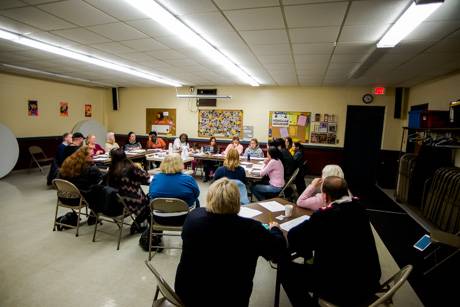
The Salvation Army and United Methodist Church are ready to provide shelter to those who need it in very cold weather, said Robert Kurtz, with the American Red Cross, yesterday following a meeting of homeless-aid advocates.
The Red Cross facility would house the men and the church would take in families.
The goal is to be ready to provide shelter when needed starting Dec. 1, but the real deadline is any night when the temperature drops as low as 10 degrees.
The coalition of church leaders, community activists and social service workers actually started meeting a year ago with the goal of ensuring there were services available for homeless people in Genesee County during cold weather.
There were originally more than 100 members, but the numbers dwindled and only recently the group has seen a resurgence in participation.
Some of the newer members yesterday raised questions about the 10-degree threshold for opening shelters: Why can't something be done sooner with cold weather coming on fast? Why can't a permanent shelter be located immediately?
Mary Rice, with Pathstone, who was chairing the meeting, explained that the 10-degree standard was adopted because that's the standard in Rochester and Buffalo.
While Kurtz said in an emergency, shelter could be provided now, the coalition is still looking to raise funds for cots and other materials.
The issue of a permanent shelter is far more complicated.
Rice said she's spoken with volunteers in Lockport who worked for two years before successfully opening a shelter there.
There are a number of tasks to completed before opening a permanent facility, from forming a board of directors and appointing a treasurer to finding a location and getting proper approvals, plus dealing with all the logistics involved in providing warm beds and meals to those in need.
The cost of the project would easily get into six figures.
After the meeting, some of the folks attending who have experience dealing with the economically insecure in Batavia suggested there aren't many people in need of shelter locally. On any given day, there are no more than five people Batavia without shelter at night, they say. Typically, those who face economic insecurity live within a network of people in similar circumstances. They will share shelter when available ("couch surfing" as it's called) and even share food stamps and other resources to support each other.
There have been times in recent years when shelters have been opened on cold winter nights in Batavia but nobody has shown up looking for a warm bed.
The meeting ended with some acrimony. A gentleman who identified himself as living in the camp previously covered by The Batavian didn't like the coverage. He didn't like the pictures being published. He didn't like some of the comments left on Facebook that were mean spirited toward whomever was living in the camp (the identity of occupants and location of the camp were not revealed). He was concerned his employer wouldn't like the coverage and the comments, though he admitted he hadn't talked with his employer about it. A couple of members of the coalition expressed their own displeasure with the coverage and a couple of members defended it.
